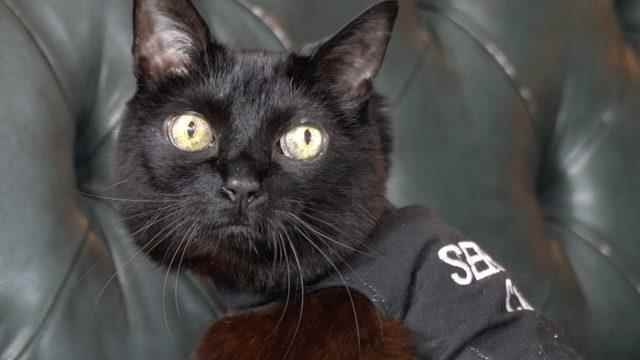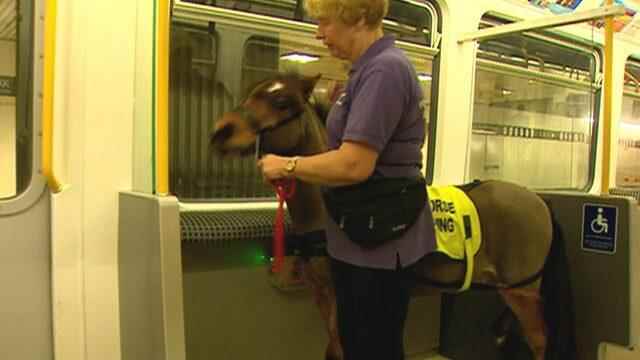An autistic person in England is preparing to sue the giant supermarket chain Sainsbury, who refused to let her emotionally supportive cat in.
London-based designer and writer Ian Fenn says that not being allowed to enter the market for his cat Chloe, who is always with him in his daily life, limits his freedom.
Although Ian Fenn says that being with his cat calms him down, the supermarket argues that cats, unlike dogs, pose a hygienic threat to foodstuffs.
If the judges uphold Fenn’s case, it could be a precedent in law.
Sainsbury, on the other hand, explained that he is working with environmental health officials on how Ian and his cat can enter the store safely.
Having experienced extreme excitement and panic in crowded and noisy places for years, Ian was recently diagnosed with autism.
Realizing that he could stay calm even in stressful environments when he was with his cat, Chloe, Ian began to train the cat and take it with him everywhere.
We met with Ian and Chloe in a pub in south London. Chloe sat on the special cushion reserved for her next to Ian, watching intently as they sipped their beer.
Chloe wears a vest that says “Working cat” on it and occasionally cracks up on Ian’s treats. During the hour we were together, he turned his head from time to time, but never left his cushion.
Outside the pub, he either sits on Ian’s shoulder or walks beside him on a leash.
“I’ve noticed that my life gets better with Chloe by my side. Normally, in crowded environments, I’m stressed out by extreme environmental influences and withdrawn. But when I’m with Chloe, I focus my attention on her,” says Ian.
“It brings order to my life. It wakes me up in the morning. It reminds me when it’s time to go to bed. It’s hard to know your feelings about this relationship, but now I feel like we’re a team,” she adds.
Chloe has been to more than 30 restaurants and pubs, many public events, hospitals, and has taken buses and trains with Ian many times this year. Ian announces that he will come to his destination with his cat in advance. But Chloe is not accepted everywhere.

When the two went to Sainsbury’s branch close to home in March, they were told that they could not go inside together and that the cat had to stay outside.
“I was so depressed. I was too confused anymore to remember why I was there, what I went to buy. It was a huge blow to my self-confidence. It took me weeks to muster up the courage to go out again,” says Ian.
When Ian complained, the supermarket informed him that only guide dogs were taken into the shop.
It was noted that Chloe may not cause a problem, but if the principle on this issue is changed, the cats brought by other customers may cause a mess.
This is where the issue starts to become the subject of a complex legal process, because the laws regarding animals that provide emotional support are not very clear.
To Ian, Chloe is a well-trained support animal. The term support animal is used in law for animals that help people who need help with something.
Under the UK’s Equal Rights Act 2010, business owners are obliged to take reasonable measures to ensure that people with disabilities are not disadvantaged. The ‘disability’ category also includes autism in the UK because it is a trait that is known to affect people’s daily lives.

“We want to be inclusive outlets where people enjoy working and shopping, and we understand that some of our colleagues and customers need support in the shops. But at the same time, safety is our top priority and our colleagues are committed to maintaining high standards of food cleanliness,” the Sainsbury supermarket chain said in a statement. they are trained to find a balance between supporting our customers,” he says.
“We are in contact with the local environmental health department and are examining whether we can find a way for our customer to visit our shop without compromise.”
Ian, on the other hand, does not agree with the view that the supermarket chain’s stance is reasonable and is therefore preparing to take the matter to court.
“It’s not customary for someone to walk around the supermarket with their cat, I admit. But I don’t want to attract attention. I just want to live my normal life. So when someone says, ‘You can’t because you have a cat helping you,’ it really breaks my heart.
An unprecedented case
Chris Fry, one of the UK’s leading disability rights expert lawyers, will represent Ian in court.
“The basic and indispensable principle here is that service providers are obliged to take reasonable measures to meet the needs of their customers with disabilities. Regulations for guide dogs or providing assistance to customers with disabilities have long been recognized as among these reasonable measures. The animal issue was not brought up,” he says.
In fact, horses and ponies are trained as support animals in the UK, but this issue is more heatedly debated in the US.
Four years ago, American airlines reported receiving 751,000 applications for emotional support animals to accompany passengers on flights.
Applications also include a horse and a turkey.
There was even a heated debate in the national media when a passenger was not allowed to take his emotional support animal, the peacock, on the plane.
Eventually, the US government passed the law that emotional support animals other than dogs are not allowed on board.
This is the legal situation in the USA, but Ian’s lawyer thinks that a legal process should be experienced in England in parallel with the progress in social acceptance of the equality and rights of the disabled.

